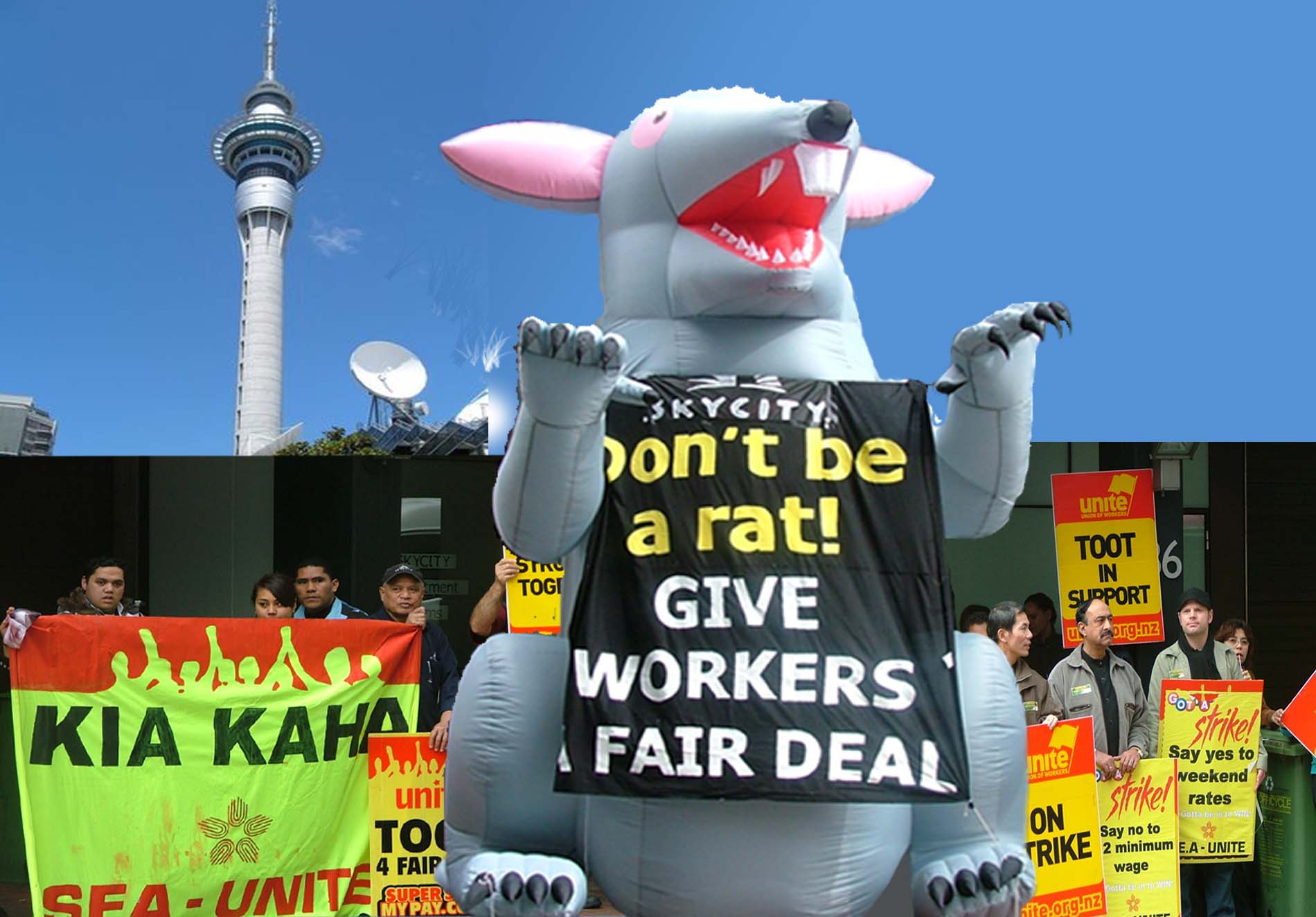How do you take on a powerful company when over a third of the staff are not in the union? Laurie Garnet finds union members at Auckland’s SkyCity casino are coming up with creative solutions.
SkyCity casino is on course to make $110 million profit this year. So when the company offered a 4% increase to staff, with new staff starting on the minimum wage of $12 an hour, it was flatly rejected by union members.
There are two unions at the casino – SEA-Unite with nearly 1000 members, and the Service and Food Workers Union with around 300 members. They wanted a 5% increase and recognition of service for longer serving staff. They voted to take strike action and to keep up the fight up for the next six months if necessary.
Barely had the vote been counted (97% rejecting the company offer) when workers started walking off the job.
Flexible tactics
With over 40% of the staff not in a union, closing down the casino with an all-out strike was not possible. So rather than fight a fixed battle of “out the gate and stay out”, the workers adopted guerrilla tactics. In groups of two or more, at different times, from various departments, they went on strike.
Some were on strike for half an hour, some for an hour, some for a whole shift, and some for several days. One member stayed out for a full 26 days. Some went on a go-slow, while others put a ban on certain duties. The members were encouraged to take the initiative.
Alongside sporadic actions, bigger strikes were called, with the element of surprise being used. Union officials went on to the gaming floors with megaphones and whistles to call for a stoppage.
Maximising opportunities
While the right to strike is very restricted in law, when contract talks break down there is an opening that does not exist at any other time. Strike action becomes legal, and unrestricted. union members – as long as there are at least two involved – can take industrial action at any time without giving notice (except in essential industries). This was legal under the previous Employment Contracts Act too, but difficult because employers could use outside labour and lock out the strikers more readily.
Now, under the Employment Relations Act, the use of outside labour is unlawful, and non-union staff can refuse to do the work of strikers. Managers who try to intimidate staff can be fined $5000.
In the first week of the dispute the bosses, fearing all out stoppages, took heart when they managed to keep the casino open by boosting staffing numbers. Lead negotiator for the unions, Matt McCarten, warned the company not to feel too smug: “We were not trying, as you imply, to close SkyCity down. We are trying to send you a message that your pay offer to your staff stinks and you need to reconsider it.”
The aim was to maximise pressure on the company, not the workers. The unions decided that whenever staffing levels were high it was better to continue working, but when numbers were down they should call a strike. Simultaneous, short strikes caused the most disruption and cost to the company, with the least cost to the workers.
Developing workers as leaders
SEA-Unite has a strong site committee with delegates who have a depth of experience. Many have worked at the casino for 10 years and they have built a union that is member-controlled and democratic. Special strike committees were formed by active union members who coordinated actions in their departments during the dispute.
SEA-Unite maintained constant communication with the union members through an information table in the cafeteria manned by Unite officials from 7am until midnight, seven days a week. Newsletters with updates on what’s happening were produced every day or so. All correspondence from the employer to the union was put on the union noticeboard and website so that members were kept fully informed. From the third week of the dispute short meetings of delegates and strike captains were held every day at regular times in the staff cafeteria.
The company, on its part, tried blocking emails being sent by the unions to members on site. The bosses also threatened to remove union material from the staffroom and tried to restrict union officials’ access, saying they would trespass any unionist who used a whistle or megaphone in the casino.
Hoping to unnerve the union members, the company offered non-union staff a pay rise and said that if they then joined the union they would lose the increase.
Offering inducements to stay out of the union is unlawful and can be challenged by the unions. But the decisive battles are fought in the workplace, not in the courts. The non-union workers, interestingly, rebelled. Many did not agree to the company’s 4% offer and demanded more. This meant the company faced resistance on both sides, from union and non-union staff.
Week three of the dispute saw Unite enlist the help of a giant inflatable rat. Standing six metres high, the rat joined the picket line and drew crowds of onlookers. Unite’s national director Mike Treen, explained that the rat was used by unions in the United States and had become an “international symbol of exploitation and a rallying point for working people to give solidarity to other workers in need”.
As we go to print, the dispute is not yet over but negotiations are under way.
The creative tactics of the casino workers have strengthened their hand. They may also inspire other unionists to find new and effective ways to fight.

